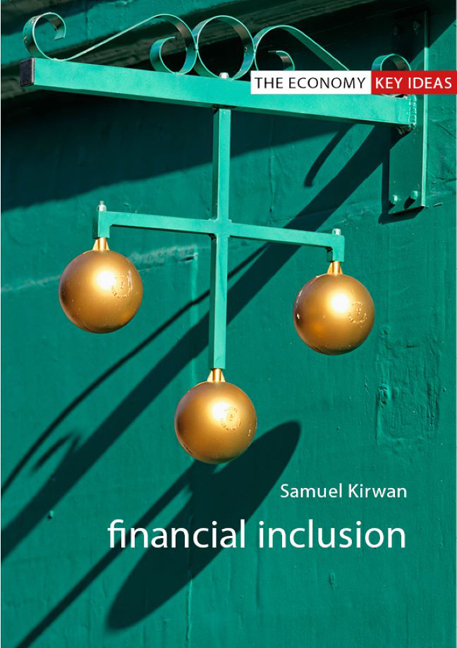Book contents
- Frontmatter
- Contents
- 1 Introduction
- 2 What is financial inclusion?
- 3 Financial inclusion as a tool of poverty eradication: the case of microcredit
- 4 Financial inclusion as the production of new markets: the case of reverse redlining
- 5 Financial inclusion as financial subjectivity: the case of financial capability in the UK
- 6 Financial inclusion as political project: the case of conditional cash transfers
- 7 Financial inclusion as transformations in financial practice: the case of mobile money
- 8 Conclusion
- References
- Index
8 - Conclusion
Published online by Cambridge University Press: 21 December 2023
- Frontmatter
- Contents
- 1 Introduction
- 2 What is financial inclusion?
- 3 Financial inclusion as a tool of poverty eradication: the case of microcredit
- 4 Financial inclusion as the production of new markets: the case of reverse redlining
- 5 Financial inclusion as financial subjectivity: the case of financial capability in the UK
- 6 Financial inclusion as political project: the case of conditional cash transfers
- 7 Financial inclusion as transformations in financial practice: the case of mobile money
- 8 Conclusion
- References
- Index
Summary
Financial inclusion is an undeniably powerful and influential term, bringing together a diverse set of actors and shaping policy and practice across a broad array of settings. While its dominance is felt most keenly in develop-ment thinking, its roots lie in academic geography and social policy in the Global North, where issues of financial inclusion and exclusion are mapped over a longer duration of social change.
Rarely in this literature is financial inclusion challenged. Its assumptions about how societal change occurs, about how the lives of the poor can be improved and about where previous development policies and social policy have gone wrong retain an unquestioned status, not only among the key players in the financial inclusion assemblage, but also among governments, international institutions and major financial corporations. Following Raymond Williams’ exploration of keywords, its positive emotional force and semantic flexibility give it a similar socio-cultural role to the term “community”: the “warmly persuasive word to describe an existing set of relationships, or the warmly persuasive word to describe an alternative set of relationships” (Williams 1983: 76). The power of financial inclusion lies less in any specific societal changes it names (indeed, it can refer to a variety of opposing and contradictory policies and transformations). Rather, the influence of the term lies in its conveying of a fuzzy and happy feeling, promising positivity and inclusive change and a progressive project that everyone can agree on. It would seem immoral to argue against financial inclusion; as Philip Mader (2018: 464) asks, who would argue for financial exclusion?
In seeking to pin down the meaning of financial inclusion, I noted in Chapter 2 that the financial inclusion literature can be characterized by a set of key assumptions. The chapters of this book have surveyed the different modalities of financial inclusion: as a tool of poverty eradication; as a market-driven process of creating new markets from formerly excluded groups; as a form of intervention into the financial subjectivity of the poor; as a long-term political project seeking societal transformation; and as the everyday effects of user-generated financial creativity. Another way of stating this is that the book has surveyed a range of contexts in which financial inclusion is at stake. Having explored this diverse terrain, I can now consider and assess these assumptions in a new light.
- Type
- Chapter
- Information
- Financial Inclusion , pp. 99 - 110Publisher: Agenda PublishingPrint publication year: 2021

